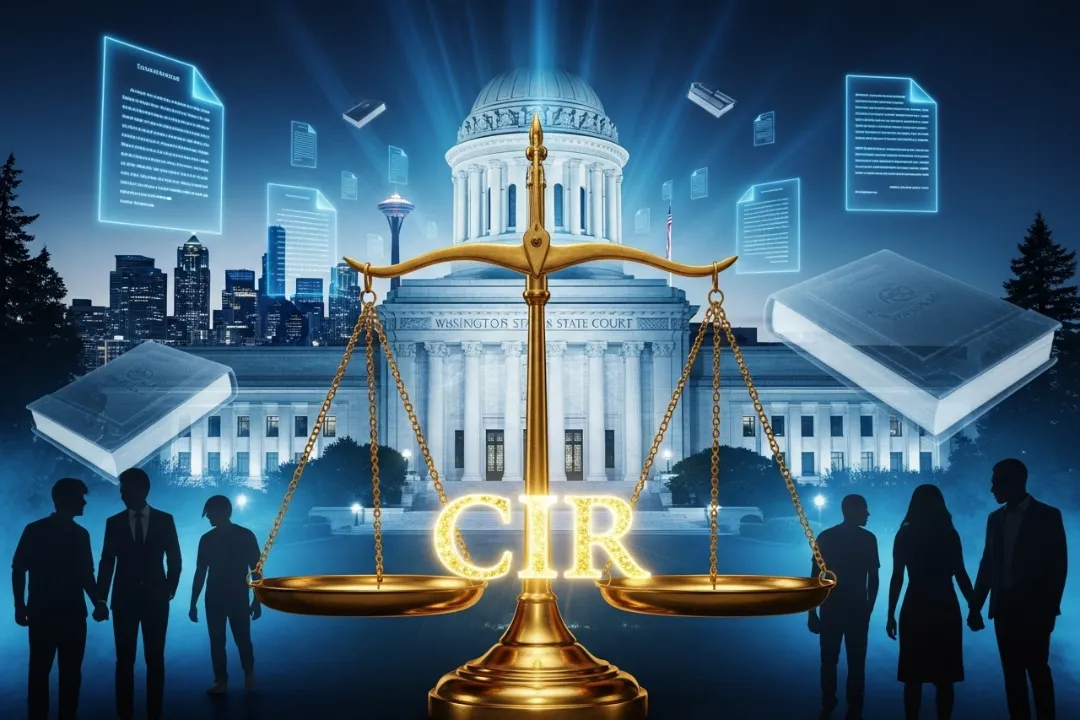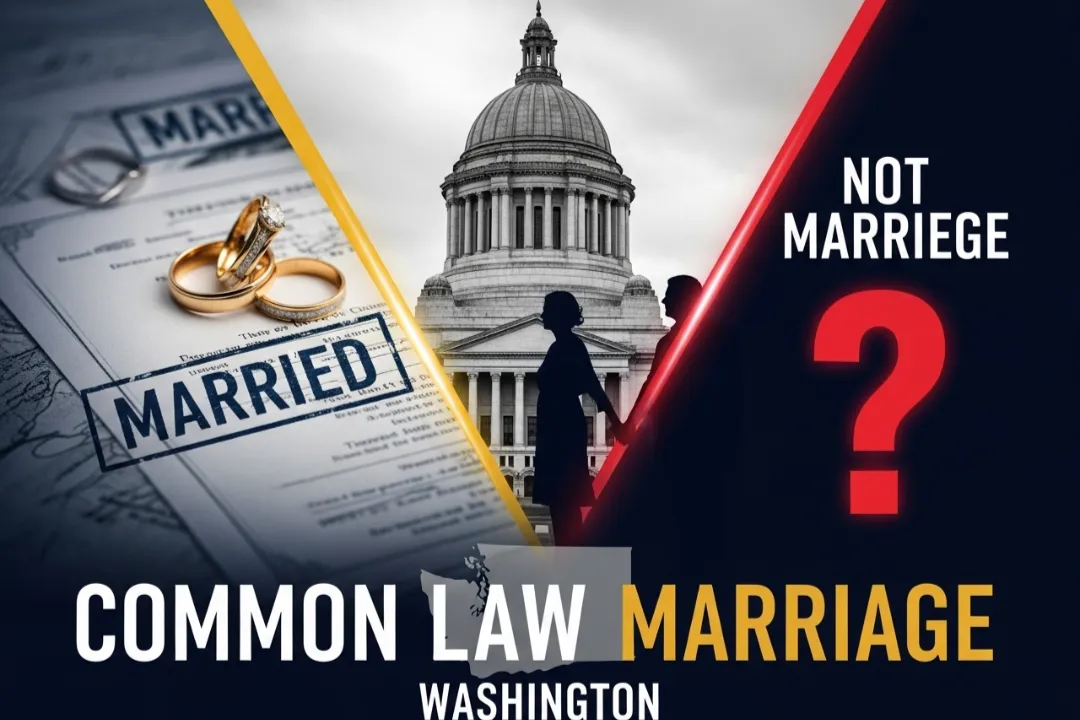Understanding the legal complexities surrounding common law marriage washington requirements is crucial for thousands of couples who choose to live together without formal wedding ceremonies. While many Americans believe that simply cohabiting for a certain period automatically creates a marriage, the reality in Washington State is far more nuanced and potentially surprising. Common law marriage washington laws differ significantly from other states, and couples who assume they have marital rights could face devastating financial and legal consequences when their relationships end.
Washington State does not recognize common law marriage washington unions formed within its borders, a fact that shocks many long-term couples who discover their assumed marital status holds no legal weight. However, the state has developed a unique legal framework called “Committed Intimate Relationships” that provides some protections for unmarried couples living together. Understanding these distinctions could mean the difference between financial security and devastating loss when relationships dissolve, making this knowledge essential for anyone considering or currently in a common law marriage washington arrangement.
The landscape of American relationships has evolved dramatically in recent years, with 49.3% of Americans age 15 and over remaining unmarried as of 2022 according to the U.S. Census Bureau. This shift toward alternative relationship structures makes understanding common law marriage washington laws more critical than ever before. For couples in Washington State, the absence of traditional common law marriage recognition creates unique challenges that require careful planning and legal awareness to protect both partners’ interests and ensure fair treatment under state law.
The consequences of misunderstanding common law marriage washington regulations extend far beyond simple legal technicalities. When unmarried couples separate in Washington State, they may discover that years of shared financial contributions, joint property ownership, and intertwined lives provide no automatic legal protections. Unlike traditional marriages, which offer clear guidelines for property division and spousal support, couples in common law marriage washington situations must navigate a complex legal landscape that may leave one or both partners financially vulnerable and emotionally devastated.
Understanding Common Law Marriage Washington Legal Framework
The legal framework surrounding common law marriage washington relationships requires careful examination to understand how the state approaches unmarried couples’ rights and responsibilities. Washington State explicitly rejects traditional common law marriage concepts, instead creating its own system for recognizing certain long-term relationships. This approach reflects the state’s commitment to protecting unmarried couples while maintaining clear distinctions between formal marriage and alternative relationship structures.
Common law marriage washington legal precedents have evolved through decades of court decisions that have shaped how unmarried couples’ rights are determined and protected. The Washington Supreme Court has consistently held that while the state will not recognize common law marriages formed within its borders, it will acknowledge such marriages validly created in other jurisdictions. This distinction becomes particularly important for couples who relocate to Washington from states that do recognize common law marriage arrangements.

The development of Washington’s unique approach to common law marriage washington issues stems from the state’s recognition that many couples live in marriage-like relationships without formal ceremonies. Rather than ignoring these relationships entirely, Washington courts have developed the Committed Intimate Relationship doctrine to address property rights and other legal issues that arise when such relationships end. This framework provides some protections while avoiding the full legal implications of marriage.
Common law marriage washington cases have established specific criteria that courts use to determine whether a relationship qualifies for legal recognition under state law. These criteria focus on the nature and duration of the relationship, the couple’s intent to be in a committed partnership, and various factors that demonstrate the marriage-like quality of their union. Understanding these elements is crucial for couples who may need to rely on legal protections when their relationships end.
The practical implications of common law marriage washington laws extend to numerous areas including property division, debt responsibility, and child custody arrangements. While these relationships may not receive full marital recognition, they can still trigger significant legal consequences that affect both partners’ financial future and personal well-being. Couples must understand these potential outcomes to make informed decisions about their living arrangements and legal planning.
Committed Intimate Relationships: Washington’s Alternative to Common Law Marriage Washington
Washington State’s Committed Intimate Relationship doctrine serves as the primary legal mechanism for addressing common law marriage washington issues and providing protections for unmarried couples. This unique legal framework recognizes that some relationships, while not formal marriages, deserve legal consideration when it comes to property division and other practical matters. The CIR doctrine represents Washington’s attempt to balance respect for traditional marriage with acknowledgment of modern relationship patterns.
The criteria for establishing a common law marriage washington equivalent through CIR status involve multiple factors that courts consider when determining whether a relationship qualifies for legal recognition. Courts examine the length and continuity of the relationship, typically requiring at least two to three years of cohabitation. The exclusivity of the relationship plays a crucial role, as courts look for evidence that both partners committed to each other in a manner similar to married couples.
Common law marriage washington couples seeking CIR recognition must demonstrate that they held themselves out as committed partners to their community, friends, and family. This includes evidence such as joint financial accounts, shared property ownership, mutual financial support, and public acknowledgment of their relationship. Courts also consider whether the couple made long-term plans together and whether they presented themselves as a committed unit in social and professional settings.
The legal consequences of establishing a common law marriage washington equivalent through CIR status are significant but limited compared to formal marriage. When a CIR relationship ends, courts will divide property acquired during the relationship using community property principles similar to those applied in divorce proceedings. However, CIR partners cannot claim spousal support or maintenance, and they do not receive the same tax benefits, inheritance rights, or social security benefits available to married couples.
Common law marriage washington couples should understand that CIR status provides protection primarily for property division purposes and does not confer the full range of marital rights and responsibilities. While this limitation may seem restrictive, it reflects the state’s careful balance between protecting unmarried couples and maintaining distinct benefits for formal marriage. Couples considering long-term cohabitation should carefully weigh these limitations against the benefits of formal marriage.
Property Rights and Financial Implications of Common Law Marriage Washington
The property rights implications of common law marriage washington arrangements present some of the most complex and consequential aspects of these relationships. When couples live together for extended periods without formal marriage, they often commingle assets, make joint purchases, and build shared financial lives that can become extraordinarily difficult to untangle when relationships end. Washington’s approach to these situations through the CIR doctrine provides some protection but falls short of the comprehensive framework available to married couples.
Common law marriage washington property division follows community property principles when courts determine that a CIR existed between the parties. This means that property and assets acquired during the relationship are presumed to belong equally to both partners, regardless of whose name appears on titles or accounts. However, property owned before the relationship began typically remains separate property, and gifts or inheritances received by one partner during the relationship may also maintain separate status.
The financial complexities of common law marriage washington situations become particularly challenging when couples have significantly different incomes or when one partner has made career sacrifices to support the other’s professional advancement. Unlike formal marriage, where spousal support can address these imbalances, CIR relationships provide no mechanism for ongoing financial support after separation. This limitation can create significant hardship for partners who gave up career opportunities or education to support their partner’s success.
Common law marriage washington debt responsibility represents another crucial financial consideration that couples often overlook until relationships end. While jointly incurred debts during a CIR relationship are typically divided between partners, determining which debts qualify as joint obligations can be complex and contentious. Couples should maintain clear records of debt obligations and consider formal agreements to clarify financial responsibilities.
The tax implications of common law marriage washington relationships differ substantially from those affecting married couples, both during the relationship and after separation. Unmarried couples cannot file joint tax returns, claim spousal exemptions, or take advantage of various tax benefits available to married couples. These limitations can result in significantly higher tax obligations and should factor into couples’ financial planning decisions.
Legal Protections and Limitations for Common Law Marriage Washington Couples
The legal protections available to common law marriage washington couples remain significantly limited compared to those enjoyed by formally married partners, creating potential vulnerabilities that many couples fail to recognize until crisis situations arise. While the CIR doctrine provides some safeguards, particularly regarding property division, numerous areas of law treat unmarried couples less favorably than married spouses, regardless of their relationship’s duration or commitment level.
Healthcare decision-making represents one of the most critical areas where common law marriage washington couples face significant limitations. Unmarried partners typically cannot make medical decisions for each other during emergencies or incapacitation unless they have executed specific legal documents such as healthcare powers of attorney. Hospitals and medical facilities may exclude unmarried partners from important decisions and even restrict visitation rights during critical illness or injury.
Common law marriage washington couples also face substantial challenges in estate planning and inheritance matters. Unlike married spouses who inherit automatically under Washington’s intestacy laws, unmarried partners receive no inheritance rights regardless of their relationship’s length or nature. Without proper estate planning documents including wills, trusts, and beneficiary designations, a deceased partner’s assets may pass to blood relatives while leaving the surviving partner without financial security.
Social Security and employee benefits present additional areas where common law marriage washington couples encounter discrimination under federal and state laws. Unmarried partners cannot claim Social Security survivor benefits, and many employer benefit plans do not extend coverage to unmarried partners. These limitations can create significant financial hardships, particularly for couples where one partner depends on the other’s income or benefits.
The parental rights implications of common law marriage washington relationships become particularly complex when couples have children together. While both biological parents have equal rights and responsibilities regarding their children, unmarried partners have no legal relationship to their partner’s children from previous relationships unless they pursue formal adoption procedures. This limitation can create emotional and practical difficulties when relationships end or when biological parents become incapacitated.
Common Law Marriage Washington Recognition from Other States
Washington’s treatment of common law marriage washington unions validly formed in other jurisdictions represents an important exception to the state’s general non-recognition policy. The state follows the principle that marriages valid where celebrated remain valid when couples relocate to Washington, including common law marriages properly established in states that recognize such unions. This recognition policy creates opportunities and complications for couples who move to Washington from common law marriage states.
Currently, only eight states plus the District of Columbia recognize common law marriage washington equivalent relationships formed within their borders: Colorado, Iowa, Kansas, Montana, New Hampshire, Texas, Utah, and the District of Columbia. Couples who established valid common law marriages in these jurisdictions can expect Washington courts to recognize their marital status and provide full marital rights and protections under Washington law.
The requirements for establishing valid common law marriage washington relationships in recognizing states vary significantly, making it crucial for couples to understand the specific criteria that applied in their former state of residence. Most states require that couples live together for substantial periods, hold themselves out as married to their community, and intend to be married. Some states have specific duration requirements, while others focus more on the couples’ conduct and intent.

Common law marriage washington recognition issues can become complex when couples lived in multiple states or when their relationship began in a non-recognizing state but continued in a recognizing jurisdiction. Courts must determine where and when the common law marriage was established and whether the couple met all requirements under that state’s law. These determinations can significantly impact property rights, spousal support obligations, and other marital benefits.
Couples who believe they may have established common law marriage washington equivalent relationships in other states should gather documentation to prove their marital status, including joint financial records, tax returns, insurance policies, and witness testimony about their relationship. Establishing the validity of an out-of-state common law marriage can provide substantial legal and financial benefits but requires careful documentation and potentially legal assistance.
Planning Strategies for Common Law Marriage Washington Couples
Couples living in common law marriage washington arrangements who choose not to formally marry must engage in comprehensive legal planning to protect their interests and create the security that marriage typically provides automatically. This planning becomes particularly crucial given the limited legal protections available to unmarried couples under Washington law and the potential for devastating consequences when relationships end unexpectedly.
Cohabitation agreements represent the most important planning tool for common law marriage washington couples, providing a contractual framework for addressing property rights, financial responsibilities, and other important matters. These agreements can specify how property will be divided if the relationship ends, how debts will be allocated, and whether either partner will provide financial support to the other after separation. Well-drafted cohabitation agreements can prevent costly litigation and provide clarity during emotionally difficult separations.
Common law marriage washington couples should prioritize estate planning documents that replicate many of the automatic benefits that marriage provides to spouses. Wills, trusts, powers of attorney for financial and healthcare decisions, and advanced healthcare directives become essential for protecting unmarried partners. These documents ensure that partners can make important decisions for each other and inherit property according to their wishes rather than state intestacy laws.
Financial planning for common law marriage washington couples requires careful attention to beneficiary designations on retirement accounts, life insurance policies, and other financial instruments. Unlike married couples who often name spouses as automatic beneficiaries, unmarried couples must actively designate their partners and regularly update these designations. Failure to maintain current beneficiary information can result in assets passing to unintended recipients.
Property ownership structures present important considerations for common law marriage washington couples who want to ensure both partners have rights to jointly acquired assets. Holding property as joint tenants with rights of survivorship can provide inheritance protection, while clear documentation of each partner’s contributions to property acquisition can support claims during relationship dissolution. Couples should maintain detailed records of financial contributions and consider formal agreements regarding major purchases.
Child Custody and Parental Rights in Common Law Marriage Washington Relationships
Child custody and parental rights issues in common law marriage washington relationships involve complex legal considerations that affect both biological parents and their unmarried partners. Washington law treats children’s interests as paramount regardless of their parents’ marital status, but the legal framework for determining custody, support, and decision-making authority can be more complicated when parents are unmarried.
Biological parents in common law marriage washington relationships have equal legal rights and responsibilities regarding their children, regardless of whether they were ever married to each other. Both parents can seek custody, make decisions about their children’s welfare, and have obligations to provide financial support according to state guidelines. These rights and responsibilities exist independently of the parents’ relationship status and continue even if the couple separates.
Common law marriage washington situations become more complex when considering the rights of non-biological partners who have developed parental relationships with their partner’s children. Washington recognizes the concept of “de facto parents” in certain circumstances, allowing non-biological partners to seek custody or visitation rights if they can demonstrate that they have acted as a parent to the child with the biological parent’s consent and encouragement.
Establishing de facto parent status in common law marriage washington cases requires meeting specific criteria established by Washington courts. The non-biological partner must have lived with the child, taken significant responsibility for the child’s care and upbringing, and developed a parent-child relationship that serves the child’s best interests. These determinations focus on the quality and nature of the relationship rather than the formal legal status between the adults.
Common law marriage washington couples with children should consider various legal strategies to protect their family relationships and ensure continuity of care for their children. These may include adoption procedures, guardianship arrangements, or formal agreements about parental responsibilities. Planning for potential relationship changes can help minimize disruption to children and provide clarity about ongoing parental obligations.
Healthcare and Medical Decision-Making for Common Law Marriage Washington Partners
Healthcare and medical decision-making authority represent critical areas where common law marriage washington couples face significant disadvantages compared to married spouses. Washington law does not automatically grant unmarried partners the right to make medical decisions for each other or even to receive information about their partner’s medical condition. These limitations can create devastating situations during medical emergencies or extended illnesses.

Common law marriage washington couples can address these healthcare limitations through comprehensive advance directive planning that includes healthcare powers of attorney, living wills, and HIPAA authorization forms. Healthcare powers of attorney grant unmarried partners the legal authority to make medical decisions when their partner becomes incapacitated, while living wills provide guidance about end-of-life care preferences. HIPAA authorizations allow healthcare providers to share medical information with designated partners.
Hospital visitation rights present another challenge for common law marriage washington couples, particularly during critical illness or emergency situations. While many hospitals now recognize domestic partnerships and committed relationships, federal and state laws do not guarantee unmarried partners the same visitation rights as spouses. Some facilities may restrict access to immediate family members only, potentially excluding long-term unmarried partners during crucial moments.
Common law marriage washington couples should ensure their healthcare planning documents are properly executed, readily accessible, and known to relevant healthcare providers. Carrying wallet cards that identify emergency contacts and medical decision-makers can be crucial during emergency situations when formal documents may not be immediately available. Couples should also inform family members about their wishes regarding their partner’s role in medical decisions.
Insurance coverage considerations for common law marriage washington couples vary significantly depending on the type of insurance and the provider’s policies. While some employers now offer domestic partner benefits, many insurance companies do not extend coverage to unmarried partners. Couples should carefully review their insurance options and consider individual policies when necessary to ensure adequate coverage for both partners.
Financial Planning and Tax Considerations for Common Law Marriage Washington Couples
The financial planning implications of common law marriage washington relationships extend far beyond simple budgeting and require careful attention to tax strategies, retirement planning, and investment management. Unmarried couples face different tax obligations and planning opportunities compared to married couples, making sophisticated financial planning essential for optimizing their economic situation and protecting their long-term financial security.
Tax planning for common law marriage washington couples involves understanding the advantages and disadvantages of filing separate returns rather than joint returns available to married couples. While some unmarried couples may pay higher overall taxes due to inability to file jointly, others may benefit from lower tax brackets or different deduction opportunities. Couples should analyze their specific situation annually to optimize their tax strategy and potentially adjust income timing or deduction strategies.

Retirement planning presents unique challenges for common law marriage washington couples who cannot rely on spousal Social Security benefits or traditional spousal IRA advantages. Unmarried partners typically cannot inherit IRA or 401(k) accounts with the same tax advantages available to surviving spouses, potentially creating significant tax obligations when accounts are inherited. Couples should consider alternative retirement planning strategies and ensure proper beneficiary designations are maintained.
Common law marriage washington couples should coordinate their investment and savings strategies to maximize their combined financial position while protecting individual interests. This may involve optimizing asset allocation across both partners’ accounts, coordinating contribution strategies for tax-advantaged accounts, and ensuring appropriate diversification of investments. Regular financial reviews can help couples adjust their strategies as their relationship and financial situation evolve.
Estate planning coordination becomes particularly important for common law marriage washington couples who want to provide financial security for their partners while minimizing tax obligations. Strategic use of trusts, life insurance, and other planning tools can help accomplish these goals while addressing the unique challenges faced by unmarried couples. Professional financial and legal advice becomes essential for implementing sophisticated planning strategies.
Legal Documentation Requirements for Common Law Marriage Washington Couples
Legal documentation requirements for common law marriage washington couples are extensive and crucial for protecting both partners’ interests across numerous areas of law and personal finance. Unlike married couples who receive many legal protections automatically, unmarried couples must create comprehensive documentation to establish rights and responsibilities that mirror some aspects of marriage while addressing the unique challenges of their legal status.
Cohabitation agreements serve as the foundation of legal planning for common law marriage washington couples, providing contractual clarity about property rights, financial obligations, and relationship expectations. These agreements should address how property acquired during the relationship will be owned and divided, how debts and expenses will be shared, and whether either partner will provide support to the other if the relationship ends. Well-drafted agreements can prevent costly disputes and provide security for both partners.
Common law marriage washington couples need comprehensive estate planning documentation including wills, trusts, powers of attorney for finances and healthcare, and advanced healthcare directives. These documents ensure that partners can make important decisions for each other and inherit property according to their wishes. Regular updates to these documents become necessary as relationships evolve and financial situations change.
Property documentation for common law marriage washington couples requires careful attention to how assets are titled and owned. Joint ownership of real estate, vehicles, and financial accounts can provide some protection, but couples should understand the different types of joint ownership and their implications. Maintaining records of each partner’s contributions to major purchases can be crucial for resolving disputes if the relationship ends.
Financial documentation for common law marriage washington couples should include records of shared expenses, joint investments, and individual financial contributions to the relationship. Bank statements, tax returns, and investment records can be essential for establishing financial claims if disputes arise. Couples should maintain organized financial records and consider formal agreements for major financial decisions.
Disclaimer
Legal Disclaimer: The information provided in this article is for educational and informational purposes only and should not be construed as legal advice. Laws vary by jurisdiction and individual circumstances. Always consult with a qualified attorney or legal professional for advice regarding your specific situation. ChoiceWisely.com does not provide legal services and is not a substitute for professional legal counsel. For more information, please visit https://choicewisely.com/disclaimer/.
Conclusion: Protecting Your Future in Common Law Marriage Washington Relationships
The complex landscape of common law marriage washington law demands careful attention and proactive planning from couples who choose to live together without formal marriage. While Washington State does not recognize common law marriages formed within its borders, the state’s Committed Intimate Relationship doctrine provides some protections for long-term couples who meet specific criteria. However, these protections remain limited compared to the comprehensive benefits and security that formal marriage provides under state and federal law.
Understanding the implications of common law marriage washington requirements—or the lack thereof—can help couples make informed decisions about their relationship status and legal planning needs. The financial, legal, and practical consequences of choosing to remain unmarried in Washington State are significant and far-reaching, affecting everything from property rights and healthcare decisions to tax obligations and retirement planning. Couples must weigh these considerations carefully against their personal preferences and circumstances.
For those who choose to remain in common law marriage washington arrangements, comprehensive legal planning becomes essential to protect both partners’ interests and create the security that marriage typically provides automatically. This planning should include cohabitation agreements, estate planning documents, healthcare directives, and careful attention to property ownership and financial management. Professional legal and financial advice can help couples navigate these complex issues and implement effective protective strategies.
The importance of staying informed about common law marriage washington law cannot be overstated, as legal requirements and court interpretations continue to evolve. For those still wondering “is there a common law marriage in washington state” or “is common law marriage legal in washington state”, the answer remains that Washington does not create such marriages internally but does provide alternative protections through CIR doctrine. Couples should regularly review their legal documentation and planning strategies to ensure they remain current with changing laws and personal circumstances. For more information about legal and financial planning resources, visit ChoiceWisely.com to explore comprehensive guides and professional services.
As relationship patterns continue to evolve in modern America, understanding the legal implications of different relationship structures becomes increasingly important for protecting personal and financial interests. Whether couples choose formal marriage or alternative arrangements, informed decision-making and proper planning remain essential for building secure and stable futures together. To explore collaboration opportunities and access additional legal resources, visit ChoiceWisely.com/work-with-us/ for professional guidance and support.
Take Action: Protect Your Common Law Marriage Washington Rights Today
Don’t wait until crisis strikes to address the legal vulnerabilities inherent in common law marriage washington relationships. The time to act is now, while you can make thoughtful decisions about your legal and financial future. Whether you’re considering moving in with a partner, currently in a long-term relationship, or facing the possibility of separation, understanding your rights and options under Washington law is crucial for protecting your interests and ensuring fair treatment.
Professional legal guidance from qualified attorneys can help you navigate the complex world of common law marriage washington regulations and develop strategies tailored to your specific situation and goals. From drafting cohabitation agreements and estate planning documents to understanding property rights and tax implications, experienced attorneys can provide the insight and documentation necessary to secure your future. For additional educational content and informational resources about legal and financial topics, visit ChoiceWisely.com/contact/ to learn more about protecting your legal and financial interests in unmarried relationships through our informational blog content.
Frequently Ask Questions ?
Do unmarried couples have rights in Washington state?
Yes, unmarried couples in Washington have limited rights through “Committed Intimate Relationships” (CIR). While they don’t receive all the rights of married couples, courts can divide shared assets and debts acquired during the relationship, and parenting rights apply regardless of marital status.
What is a common law wife entitled to in Washington state?
There is no “common law wife” in Washington state since the state doesn’t recognize common law marriage. However, partners in a Committed Intimate Relationship may be entitled to equitable division of property acquired during the relationship, but not spousal support or automatic inheritance rights.
What is it called when you’re not married but live together for 7 years?
Living together for 7 years without marriage is simply called cohabitation. The “7-year rule” for automatic marriage is a myth – no state recognizes automatic marriage after any specific time period. The relationship would be legally termed cohabitation or a domestic partnership.
When did Washington state stop common law marriage?
Washington state has never recognized common law marriage. The state has consistently required formal marriage ceremonies and licenses. However, Washington will recognize valid common law marriages established in other states before couples moved to Washington.
How long do you have to live with someone to be considered married in Washington?
There is no time period that creates marriage in Washington state. You cannot become legally married simply by living together, regardless of duration. Washington requires a formal marriage ceremony and license. However, long-term relationships may qualify as Committed Intimate Relationships for property division purposes.
What rights do I have as a live-in girlfriend?
As a live-in girlfriend in Washington, you have limited legal rights. You may qualify for Committed Intimate Relationship protections for property division if you meet certain criteria, but you don’t have automatic inheritance rights, spousal support, or medical decision-making authority without proper legal documents.
How do you prove common law marriage in Washington state?
You cannot prove common law marriage in Washington state because it doesn’t exist. However, you can establish a Committed Intimate Relationship by proving: continuous cohabitation (usually 2+ years), shared finances, presenting as a couple publicly, and demonstrating a marriage-like commitment.
How many years do you have to be together to be legally married?
No amount of time living together creates a legal marriage in Washington state. You must obtain a marriage license and have a formal ceremony performed by an authorized officiant. However, relationships typically need 2+ years of cohabitation to qualify as Committed Intimate Relationships.
What is it called when you’re married but not legally married?
This is called cohabitation, domestic partnership, or living together. In Washington, long-term relationships may be recognized as “Committed Intimate Relationships” which provide some legal protections similar to marriage, but not full marital rights.
What is the 333 rule in marriage?
The 333 rule (or 3×3 rule) in marriage means each partner gets 3 hours per week of quality time alone together and 3 hours of personal time alone. This rule helps maintain balance between couple time and individual space, reducing resentment and strengthening relationships.
What are the disadvantages of common law marriage?
Common law marriage disadvantages include: no automatic inheritance rights without wills, limited legal protections, difficulty proving the relationship existed, no presumption of marriage, potential complications with medical decisions, property disputes, and varying recognition between states.
What is the legal term for boyfriend girlfriend?
Legal terms for boyfriend/girlfriend relationships include: cohabitants, domestic partners, unmarried partners, significant others, or in Washington specifically, partners in a “Committed Intimate Relationship.” The formal legal term is typically “cohabitants” or “domestic partners.”
